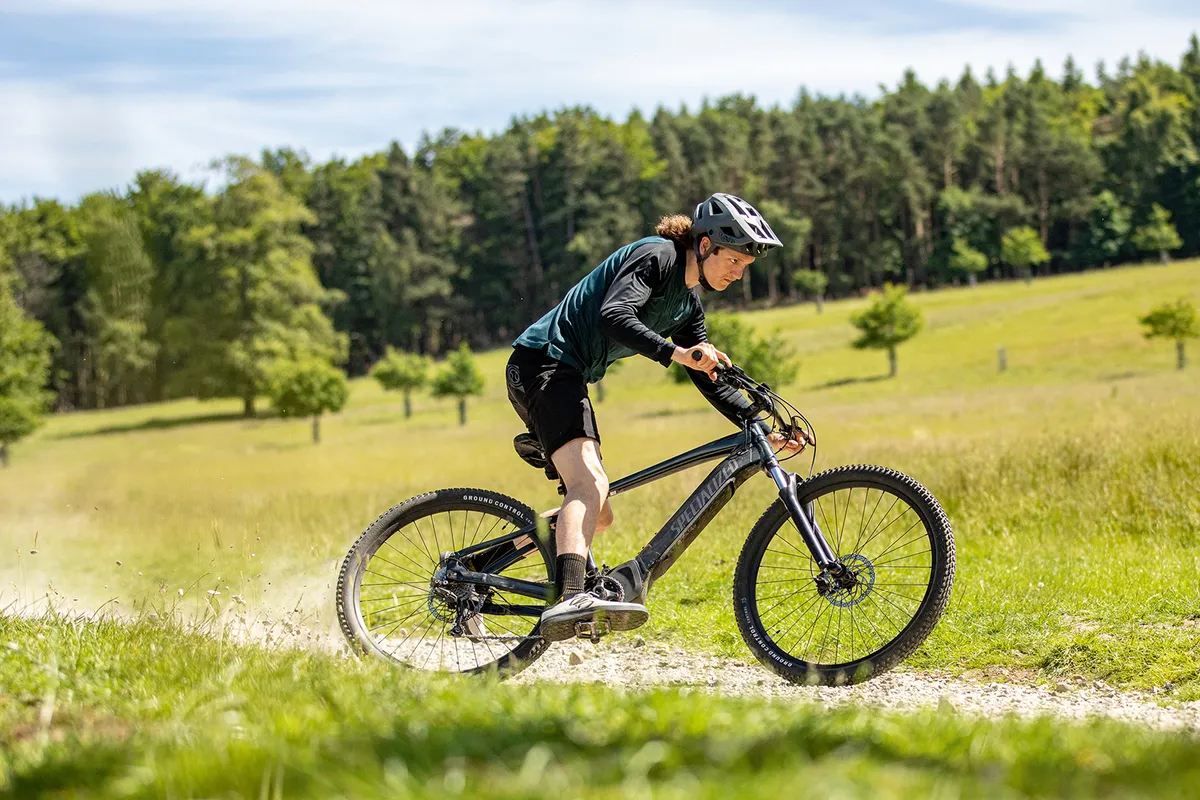While the Turbo Tero looks very much like a mountain bike, it can do everything from commuting to gravel riding and even carrying cargo and kids.
The own-brand motor is controlled from a bar-mounted computer, and you can tweak the three power modes using Specialized’s app, where you can even disable the motor and enable a motion-sensor alarm.
The powerpack is locked inside the down tube, too, for extra security.
Specialized Turbo Tero 3.0 frame
It’s clear from the Tero’s huge down tube that it’s packing some extra power.
The removable 530Wh battery gives decent range combined with Specialized’s 2.0 motor, which has just 50Nm of torque (pricier models get the considerably higher-torque 90Nm 2.2 motor).
Geometry is at the conservative end of ‘modern’ but, despite the notably long chainstays, the Tero has a very well-balanced ride quality.
Specialized Turbo Tero 3.0 spec details
The SR Suntour XCM32 fork feels crude compared to the Fox suspension on the Tero’s pricier rivals.
It has a coil rather than air spring and, while it deals adequately with bigger impacts, is clunky returning to position after taking a hit. It isn’t good at ironing out repetitive bumps.
A bigger-than-normal 36t chainring is paired with a smaller-than-usual 11-36t, nine-speed cassette.
If you ride somewhere with steep hills, having fewer sprockets and a harder easiest gear is noticeable. It’s harder to find the ‘perfect’ gear and, on steep climbs, the easiest one is too hard to spin easily.
The gears aren’t helped by the cheap Shimano shifter feeling a bit basic and requiring a forefinger, rather than a thumb, to shift down the cassette into a harder gear.
One impressive component is the own-brand Fast Track T5 tyres, fitted on cross-country style rims, which roll exceptionally quickly and have just enough tread to dig in on gravel and grass.
Specialized Turbo Tero 3.0 geometry
| | S | M | L | XL |
|---|---|---|---|---|
| Seat angle (degrees) | 73.9 | 73.4 | 72.9 | 72.4 |
| Head angle (degrees) | 66.4 | 66.4 | 66.4 | 66.4 |
| Chainstay (mm) | 470.4 | 470.4 | 470.4 | 470.4 |
| Seat tube (mm) | 400 | 450 | 460 | 500 |
| Top tube (mm) | 589 | 620 | 650 | 680 |
| Head tube (mm) | 135 | 150 | 165 | 190 |
| Fork offset (mm) | 44 | 44 | 44 | 44 |
| Trail (mm) | 114 | 114 | 114 | 114 |
| Bottom bracket drop (mm) | 57 | 57 | 57 | 57 |
| Bottom bracket height (mm) | 313 | 313 | 313 | 313 |
| Wheelbase (mm) | 1,173 | 1,200 | 1,226 | 1,252 |
| Standover (mm) | 773 | 807 | 807 | 835 |
| Stack (mm) | 637 | 651 | 664 | 687 |
| Reach (mm) | 405 | 426 | 446 | 462 |
| Crank length (mm) | 170 | 170 | 170 | 170 |
| Bar width (mm) | 720 | 750 | 750 | 750 |
| Stem length (mm) | 60 | 60 | 70 | 70 |
| Seatpost length (mm) | 300 | 400 | 400 | 400 |
Specialized Turbo Tero 3.0 ride impressions

From the word go, the Tero’s handling feels stable. It’s an easy and intuitive ride, and the geometry positions you centrally between the wheels on steep downhills, boosting confidence.
Whether dodging traffic or trees on tight singletrack, the steering is neutral, so you never seem to misjudge it.
Another big positive is the aluminium frame feels really well damped. Specialized has done an admirable job of designing a chassis that’s solid enough to handle the forces motorised power exerts, but that also smooths out bumps and stones nicely, to avoid you getting jiggled around so much.
Even though they roll really fast, the own-brand tyres grip well in the wet or dry, as long as there’s no mud.
The cheaper motor is pretty noisy, though, with a low-level whirring and a clacking that feels as if it reverberates around the down tube.
This is made worse when the drive unit is overworked – for example, when the gearing range doesn’t extend wide enough to keep your cadence sufficiently high to put the motor in its sweet spot for power delivery.
Heavier or less fit riders will struggle to get enough assistance up the steepest inclines (on tarmac and dirt), and you have to stand up and pedal hard to even keep moving on some super-steep sections.
Despite its great handling, this model’s older 2.0 motor hasn’t got anything like the same torque and power as some full-fat electric mountain bikes, and a novice rider could easily get caught out if they set off in the wrong gear or simply expect to tank along by turning the pedals gently, as you can on other electric bikes.
On the downhills, while there’s room to move from side to side on the frame, there’s no dropper post to get the saddle out of the way, so it’s hard to shift your weight back over the rear tyre to stay safe off small drops.
Specialized Turbo Tero 3.0 bottom line

The Turbo Tero 3.0 is a highly versatile contender. The own-brand battery provides decent enough range, while the ride is smooth and confidence-inspiring.
The fast-rolling Fast Track T5 tyres provide adequate grip away from the mud, but elsewhere the spec list disappoints.
Along with sluggish power delivery, this prevents the bike from truly hitting the heights and competing with better-equipped rivals
How we tested
Electric hardtails such as the three on test here don’t have any rear suspension, but do come with big, grippy tyres and front suspension to help smooth out the ride and boost confidence.
Specialized, Canyon and Orbea have designed these machines to handle proper mountain bike trails, but also to double up as all-purpose bikes, with features such as lockable batteries, lights, accessory mounts and kickstands.
We took them around our local woods and bridleways, and also on a camping trip to the Lake District with kids in tow, to find out which is the most practical and comfortable to sneak off to the trail centre on, nip about on gravel lanes on or explore the countryside with.
On test
- Canyon Grand Canyon:ON 9
- Specialized Turbo Tero 3.0
- Orbea Urrun 10
Product
| Brand | specialized |
| Price | 5900.00 AUD,3400.00 EUR,3500.00 GBP,3250.00 USD |
| Weight | 21.6000, KILOGRAM (L) - |
Features
| Fork | SR Suntour XCM32, 110mm travel |
| br_stem | Specialized Stout 3D, 70mm |
| br_chain | KMC e9T |
| br_frame | ‘E5’ aluminium alloy w/integrated battery |
| br_motor | Specialized 2.0E (50Nm max torque) / Specialized U2 530Wh battery |
| Tyres | Specialized Ground Control T5 29x2.35in |
| br_brakes | Shimano MT200, 180/160mm rotors |
| br_cranks | Specialized custom-forged |
| br_saddle | Specialized Rivo Sport |
| br_wheels | Specialized Stout XC |
| br_headset | Specialized |
| br_shifter | Shimano Alivio |
| br_cassette | Shimano CS-HG400, 11-36T |
| br_seatpost | Specialized rigid |
| br_gripsTape | Specialized Trail |
| br_handlebar | Specialized Trail, 750mm |
| br_availableSizes | S, M, L, XL |
| br_rearDerailleur | Shimano Alivio (1x9) |
